高级英语第一册第二课
- 格式:ppt
- 大小:2.33 MB
- 文档页数:80
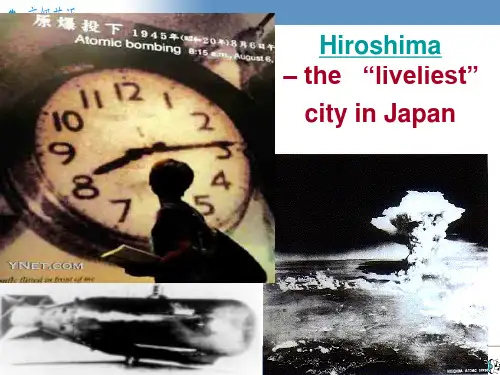
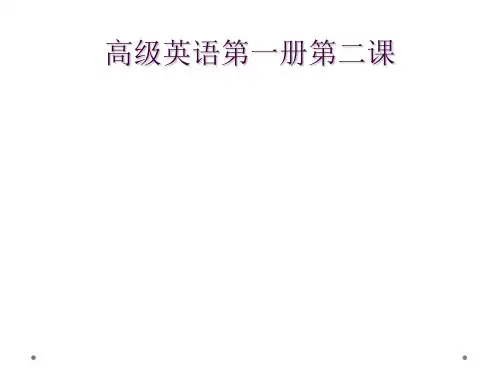
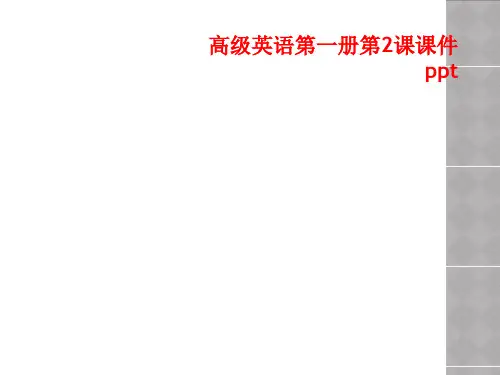
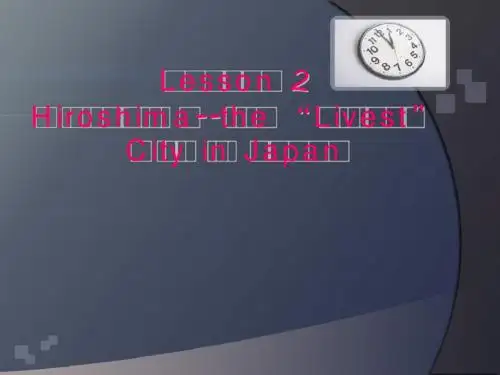
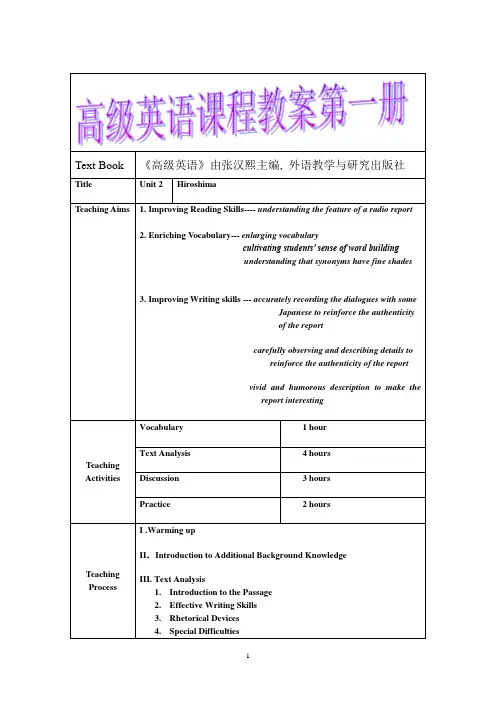
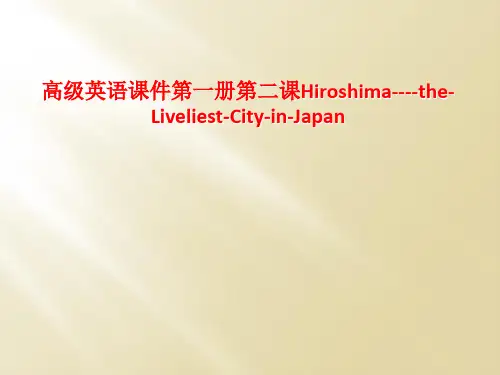
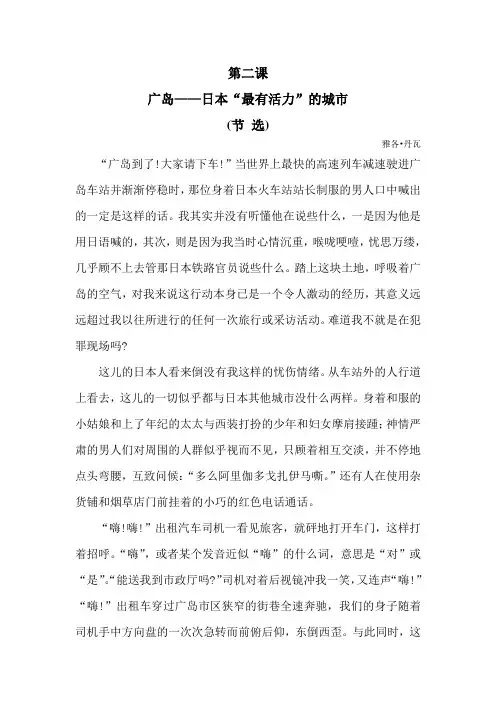
第二课广岛——日本“最有活力”的城市(节选)雅各•丹瓦“广岛到了!大家请下车!”当世界上最快的高速列车减速驶进广岛车站并渐渐停稳时,那位身着日本火车站站长制服的男人口中喊出的一定是这样的话。
我其实并没有听懂他在说些什么,一是因为他是用日语喊的,其次,则是因为我当时心情沉重,喉咙哽噎,忧思万缕,几乎顾不上去管那日本铁路官员说些什么。
踏上这块土地,呼吸着广岛的空气,对我来说这行动本身已是一个令人激动的经历,其意义远远超过我以往所进行的任何一次旅行或采访活动。
难道我不就是在犯罪现场吗?这儿的日本人看来倒没有我这样的忧伤情绪。
从车站外的人行道上看去,这儿的一切似乎都与日本其他城市没什么两样。
身着和服的小姑娘和上了年纪的太太与西装打扮的少年和妇女摩肩接踵;神情严肃的男人们对周围的人群似乎视而不见,只顾着相互交淡,并不停地点头弯腰,互致问候:“多么阿里伽多戈扎伊马嘶。
”还有人在使用杂货铺和烟草店门前挂着的小巧的红色电话通话。
“嗨!嗨!”出租汽车司机一看见旅客,就砰地打开车门,这样打着招呼。
“嗨”,或者某个发音近似“嗨”的什么词,意思是“对”或“是”。
“能送我到市政厅吗?”司机对着后视镜冲我一笑,又连声“嗨!”“嗨!”出租车穿过广岛市区狭窄的街巷全速奔驰,我们的身子随着司机手中方向盘的一次次急转而前俯后仰,东倒西歪。
与此同时,这座曾惨遭劫难的城市的高楼大厦则一座座地从我们身边飞掠而过。
正当我开始觉得路程太长时,汽车嘎地一声停了下来,司机下车去向警察问路。
就像东京的情形一样,广岛的出租车司机对他们所在的城市往往不太熟悉,但因为怕在外国人面前丢脸,却又从不肯承认这一点。
无论乘客指定的目的地在哪里,他们都毫不犹豫地应承下来,根本不考虑自己要花多长时间才能找到目的地。
这段小插曲后来终于结束了,我也就不知不觉地突然来到了宏伟的市政厅大楼前。
当我出示了市长应我的采访要求而发送的请柬后,市政厅接待人员向我深深地鞠了一躬,然后声调悠扬地长叹了一口气。
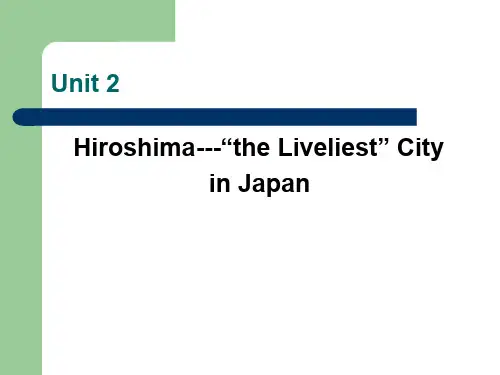

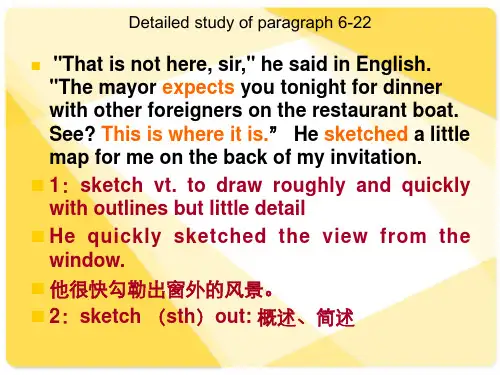
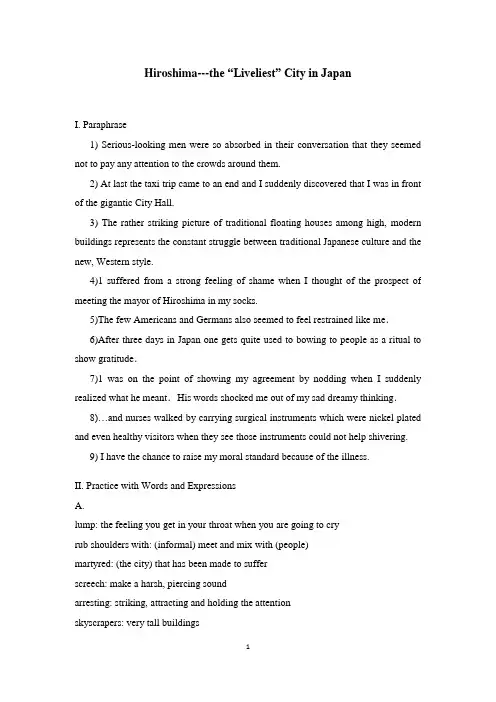
Hiroshima---the “Liveliest” City in JapanI. Paraphrase1) Serious-looking men were so absorbed in their conversation that they seemednot to pay any attention to the crowds around them.2) At last the taxi trip came to an end and I suddenly discovered that I was in frontof the gigantic City Hall.3) The rather striking picture of traditional floating houses among high, modernbuildings represents the constant struggle between traditional Japanese culture and the new, Western style.4)1 suffered from a strong feeling of shame when I thought of the prospect ofmeeting the mayor of Hiroshima in my socks.5)The few Americans and Germans also seemed to feel restrained like me.6)After three days in Japan one gets quite used to bowing to people as a ritual toshow gratitude.7)1 was on the point of showing my agreement by nodding when I suddenlyrealized what he meant.His words shocked me out of my sad dreamy thinking.8)…and nurse s walked by carrying surgical instruments which were nickel platedand even healthy visitors when they see those instruments could not help shivering.9) I have the chance to raise my moral standard because of the illness.II. Practice with Words and ExpressionsA.1.lump: the feeling you get in your throat when you are going to cry2.rub shoulders with: (informal) meet and mix with (people)3.martyred: (the city) that has been made to suffer4.screech: make a harsh, piercing sound5.arresting: striking, attracting and holding the attentionskyscrapers: very tall buildings6.stunning: very attractive; delightfully beautiful7.sink in: (to be) fully absorbed or understood8.schools: groups of people sharing the same thought9.by trade: by occupation; by way of making a livingB.1)was指事实如此;而must be意为“很可能”。
Hiroshima--- the“Liveliest” City in JapanI.Paraphrase1)Serious-looking men were so absorbed in their conversation that theyseemed not to pay any attention to the crowds around them.2)At last the taxi trip came to an end and I suddenly discovered that I was infront of the gigantic City Hall.3) The rather striking picture of traditional floating houses among high, modernbuildings represents the constant struggle between traditional Japanese culture and the new, Western style.4)1 suffered from a strong feeling of shame when I thought of the prospect ofmeeting the mayor of Hiroshima in my socks.5)The few Americans and Germans also seemed to feel restrained like me.6)After three days in Japan one gets quite used to bowing to people as a ritualto show gratitude.7)1 was on the point of showing my agreement by nodding when I suddenlyrealized what he meant. His words shocked me out of my sad dreamy thinking.8)⋯and nurses walked by carrying surgical instruments which were nickel platedand even healthy visitors when they see those instruments could not help shivering.9)I have the chance to raise my moral standard because of the illness.II. Practice with Words and ExpressionsA.1.lump: the feeling you get in your throat when you are going to cry2.rub shoulders with: (informal) meet and mix with (people)3.martyred: (the city) that has been made to suffer4.screech: make a harsh, piercing sound5.arresting: striking, attracting and holding the attentionskyscrapers: very tall buildings6.stunning: very attractive; delightfully beautiful7.sink in: (to be) fully absorbed or understood8.schools: groups of people sharing the same thought9.by trade: by occupation; by way of making a livingB.1)was 指事如此;而 must be 意“很可能”。
广岛——日本“最有活力”的城市(节选)雅各?丹瓦“广岛到了!大家请下车!”当世界上最快的高速列车减速驶进广岛车站并渐渐停稳时,那位身着日本火车站站长制服的男人口中喊出的一定是这样的话。
我其实并没有听懂他在说些什么,一是因为他是用日语喊的,其次,则是因为我当时心情沉重,喉咙哽噎,忧思万缕,几乎顾不上去管那日本铁路官员说些什么。
踏上这块土地,呼吸着广岛的空气,对我来说这行动本身已是一套令人激动的经历,其意义远远超过我以往所进行的任何一次旅行或采访活动。
难道我不就是在犯罪现场吗?这儿的日本人看来倒没有我这样的忧伤情绪。
从车站外的人行道上看去,这儿的一切似乎都与日本其他城市没什么两样。
身着和嘏的小姑娘和上了年纪的太太与西装打扮的少年和妇女摩肩接豫;神情严肃的男人们对周围的人群似乎视而不见,只顾着相互交淡,并不停地点头弯腰,互致问候:“多么阿里伽多戈扎伊马嘶。
”还有人在使用杂货铺和烟草店门前挂着的小巧的红色电话通话。
“嗨!嗨!”出租汽车司机一看见旅客,就砰地打开车门,这样打着招呼。
“嗨”,或者某个发音近似“嗨”的什么词,意思是“对”或“是”。
“能送我到市政厅吗?”司机对着后视镜冲我一笑,又连声“嗨!”“嗨!”出租车穿过广岛市区狭窄的街巷全速奔驰,我们的身子随着司机手中方向盘的一次次急转而前俯后仰,东倒西歪。
与此同时,这座曾惨遭劫难的城市的高楼大厦则一座座地从我们身边飞掠而过。
正当我开始觉得路程太长时,汽车嘎地一声停了下来,司机下车去向警察问路。
就像东京的情形一样,广岛的出租车司机对他们所在的城市往往不太熟悉,但因为怕在外国人面前丢脸,却又从不肯承认这一点。
无论乘客指定的目的地在哪里,他们都毫不犹豫地应承下来,根本不考虑自己要花多长时间才能找到目的地。
这段小插曲后来终于结束了,我也就不知不觉地突然来到了宏伟的市政厅大楼前。
当我出示了市长应我的采访要求而发送的请柬后,市政厅接待人员向我深深地鞠了一躬,然后声调悠扬地长叹了一口气。
Hiroshima---the “Liveliest” City in JapanI. Paraphrase1) Serious-looking men were so absorbed in their conversation that they seemednot to pay any attention to the crowds around them.2) At last the taxi trip came to an end and I suddenly discovered that I was in frontof the gigantic City Hall.3) The rather striking picture of traditional floating houses among high, modernbuildings represents the constant struggle between traditional Japanese culture and the new, Western style.4)1 suffered from a strong feeling of shame when I thought of the prospect ofmeeting the mayor of Hiroshima in my socks.5)The few Americans and Germans also seemed to feel restrained like me.6)After three days in Japan one gets quite used to bowing to people as a ritual toshow gratitude.7)1 was on the point of showing my agreement by nodding when I suddenlyrealized what he meant.His words shocked me out of my sad dreamy thinking.8)…and nurses walked by carrying surgical instruments which were nickel platedand even healthy visitors when they see those instruments could not help shivering.9) I have the chance to raise my moral standard because of the illness.II. Practice with Words and ExpressionsA.1.lump: the feeling you get in your throat when you are going to cry2.rub shoulders with: (informal) meet and mix with (people)3.martyred: (the city) that has been made to suffer4.screech: make a harsh, piercing sound5.arresting: striking, attracting and holding the attentionskyscrapers: very tall buildings6.stunning: very attractive; delightfully beautiful7.sink in: (to be) fully absorbed or understood8.schools: groups of people sharing the same thought9.by trade: by occupation; by way of making a livingB.1)was指事实如此;而must be意为“很可能”。
Lesson 2Hiroshima---the “Liveliest” City in JapanContentsBackground Information Video and Reading Materials Related Detailed Study Rhetorical Devices Exercise on Vocabulary Check on UnderstandingHiroshima is a seaport, capital of Hiroshima prefecture in southwest Japan.On Aug. 6, 1945, Hiroshima was the first city to be struck by an atomic bomb, dropped by the U.S. air force.Background information*Why was the bomb dropped on Hiroshima?In the US, with the atomic bomb development still underway, it was decided in September 1944 to use the bomb against Japan. The United States wanted to Force Japan's surrender as quickly as possible to minimize American casualties. In addition, the United States needed to use the atomic bomb against Japan before the Soviet Union entered the war to establish US dominance after the war. Further, the Americans wanted to use the world's first atomic bomb for an actual attack and observe its effect. For these reasons, those in charge were in a hurry. Shortly after successfully testing history's first atomic explosion on July 16, 1945, the order to drop the atomic bomb was issued on July 25. Based on this order, a field operation order dated August 2 called for the attack to take place on August 6, with Hiroshima to be the primary target.It is thought that Hiroshima was selected for the following reasons: 1.The size and topography of the city made it suitable for testing the destructive capabilities of the atomic bomb, and for confirming the destructive effects later. 2. There was a concentration of military troops, installations, and factories in Hiroshima that had been spared previous bombing.Video RelatedComments on Bombing in Japan.wmvJuly 3 - Japanese Defense Minister, Fumio Kyuma, has sparked public outrage by saying that the atomic bombings of Hiroshima and Nagasaki, was inevitable and the only way of ending World War II. Prime Minister, Shinzo Abe, is now being forced to reprimand his defense minister. The Kyodo News agency reported that Defense Minister, Fumio Kyuma, said in a speech, that the bombing on Hiroshima and Nagasaki caused great suffering in the city, but said he did not resent the US, because the bomb prevented the Soviet Union from entering the war with Japan. The comments have offended the survivors.Kyuma apologized, but opposition lawmakers called for his resignation. The Prime Minister has urged Kyuma to "take strict care with his remarks," but said the minister is not expected to resign. The remarks have dampened Abe as his cabinet's support rate has fallen below the critical 30 percent level in a poll weeks before an upper house election. This is the first time a Japanese Prime Minister's support rate had fallen this low, since 2001. And, it comes at a time when government mismanagement of pension records and voter concern about political corruption has left Abe struggling to win back support.Reading Materials RelatedHiroshema_by_Chomsky_文档.docDetailed StudyPart 1 From the railway station to the City Hall The author’s feeling when he visitedthe city: a sense of excitement, guilt, sympathy… The Japanese crowd: normal Taxi driver: polite, hospitable, patient, afraid of losing face Usher kimono---Miniskirt little old Japanese houses------concreteskyscrapersPart 2 Interview anti-climax (高潮突降法):surprise, comic, humorous,satire effect everyone’s expectation---mayor’s speech 2 schools: preserve---demolish; impact---hidePart 3 Hospital great suffering of the victimsslip [Ipr, Ip] move smoothly and easily in a particular direction 沿某方向顺畅而容易地移动: The ship slipped through the water. 船在水上平稳地航行. * I slipped along the bench next to her. 我沿长?一下子滑到她的旁 边. * This wine slips down easily, ie is pleasant to drink. 这种葡萄酒很好喝.have, etc a lump in one's/the throat (idm习语) feel pressure in the throat as a result of strong emotion caused by love, sadness, etc 喉咙哽住, 哽咽(因激动所 致).a lump in/to sb's throat: a feeling that you want to cryThere was a lump in her throat as she gazed at the child.I stood there with a lump in my throat and tried to fight back tears.preoccupy /ˌpriːˈɒk.jʊ.paɪ [T] to be the main thought in someone's mind, causing other things to be forgotten: Economic concerns are preoccupying the voters in this electionpreoccupied adj. thinking about something a lot, with result that you do not pay attention to other things全神贯 注的;入神的 She's been very preoccupied recently because her mother has been very ill. Why is the media so preoccupied with the love lives of politicians?rub shoulders with somebody informal also rub elbows with somebody:to meet sb socially or professionally 与某人作社交上或职业上的来往: to meet and spend time with people, especially rich and famous peopleIn his job he's rubbing shoulders with film stars all the time. 他在工作中一直与电影明星有来往.As a reporter he gets to rub shoulders with all the big names in politics.She claims that she rubs shoulders with (=meet) royalty all the time. 她声称她一直与王族有交往。